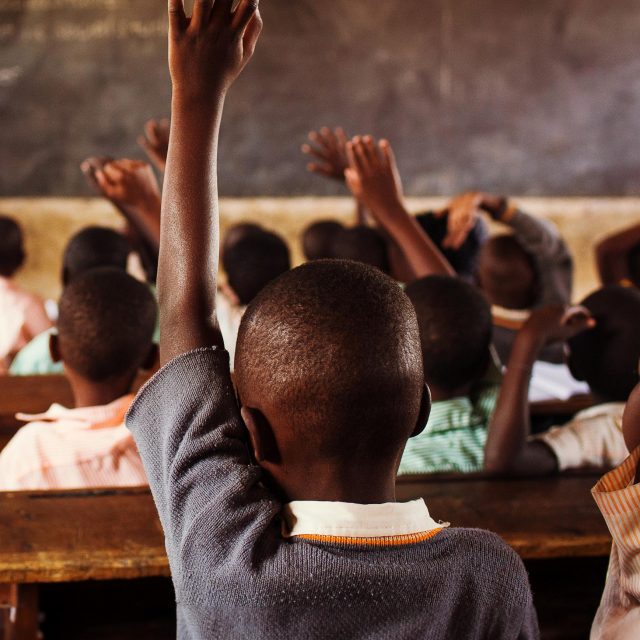Child well-being is recovering but still fragile in post-pandemic South Africa UJ research shows
Date: October 3, 2023 |
Researchers at UJ shared the results from a longitudinal assessment of child well-being titled “How well are children faring?” at a recent webinar convened by the CSDA. The findings flow from the third and final wave of data tracking 123 children in their foundation years (grade R – grade 3) from five schools in disadvantaged areas in Johannesburg from 2020 to 2022. To read the full report, click here.
The findings reveal that the children and their caregivers who are all beneficiaries of the Child Support Grant (CSG) made significant recoveries since the start of the pandemic. But children still face both economic risks to their well-being and safety, protection, and care risks.
“We are pleased that there has been recovery in some aspects of children’s well-being since the start of the pandemic in 2020. Significant progress has been made in reducing child hunger and caregiver depression levels, improved responsiveness to children’s health needs and better school participation,” explains lead researcher Leila Patel, Distinguished Professor, Social Development Studies at the CSDA, University of Johannesburg.
The project brought together South African Research Chairs supported by the NRF – Leila Patel former Chair in Welfare and Social Development, Jace Pillay, a Professor and Research Chair in Education Psychology and Elizabeth Henning, a Professor and Research Chair in integrated Studies of Learning Language, Mathematics and Science in the Primary School to conduct a longitudinal assessment of child well-being.
The project used a Community of Practice (CoP) approach that focused on enhancing children’s well-being by bolstering the social support systems around them. The CoP puts children and their families at the centre of integrated service provision. Tailored health, education, mental health and welfare services were provided to at risk children.
“This three-year study enabled the CoP team to track the impact of the pandemic on children and families. Although we have come far since 2020, we also observed that many of the problems they face hardened over time such as caregiver unemployment and child safety and protection. These are the two top risks that CSG children and their families face”. She said that it is an indication of the deteriorating economic situation in the country and ongoing challenges relating to safety and security in communities.
Signs of improvement
Although the research is sobering, there have been some positive developments. Researchers found that children’s psychosocial well-being improved dramatically over the three years, with far fewer children experiencing emotional, peer and social difficulties. It was also encouraging to see a reduction in caregiver depression with rates dropping from 52,6% in 2020 to 23,5% in 2022.
On another positive note there was improved responsiveness to children’s health needs resulting in higher vaccinations rates, increases in health screenings and more children engaging in physical activity.
The researchers also noted a marked increase in the support that parents and caregivers receive from family and social networks, rising from 30% in 2020 to 80% in 2022. Parents also reported spending more time with their children reading, singing and playing.
Child hunger dropped significantly. In 2020, 14% of children went to bed hungry and this dropped to 5% in 2022. In 2020, 14% of children didn’t have enough food to eat, this dropped to 5% in 2022. Children who didn’t eat three meals a day dropped from 12% in 2020 to 5% in 2022. This improvement is possibly due to the restarting of school feeding schemes, but the research highlighted that a third of children showed at least one sign of malnutrition.
On the education front there were mixed results with caregivers reporting improved school attendance, progress with schoolwork and homework, while teachers reported increases in school absenteeism (up from 4% to 10%) and children not progressing with their schoolwork (up from 18% to 26%).
Risks to children’s long-term development
But one of the study’s most worrying findings is that 60% of children continue to be exposed to hostile and violent behaviour at home and in the community. “This number remained consistent over time and breaking these behavioural patterns require dedicated interventions such as improving knowledge and skills of caregivers, family and the broader community. We also need to see greater responsiveness from the South African Police Service,” says Patel.
But most concerning was that children’s material well-being was compromised during the pandemic and it has not recovered. Only 16% of caregivers were employed full-time in 2022, compared with 20% in 2020. Unemployment remained stubbornly high at 63% in 2022. As a result, 60% of families are unable to save, 42% of families struggle to pay their debts and 33% don’t have money to buy things they need.
An important element of the study was tracking the number of participants who received social grants. The researchers found that social grants played a crucial role in mitigating the financial constraints facing these households. 85% of the participants received the Child Support Grant and 40% of caregivers received the Social Relief of Distress Grant.
“We saw that social grants cushioned the economic shock of the pandemic, but because grant values were low 33% of households do not having sufficient money to buy the things that they need. This indicates that there is a need to review the value of the CSG and bringing it closer to the food poverty line,” Prof Patel says.
What are the implications of this research?
“What this study demonstrates, is the importance of monitoring the multi-dimensional wellbeing of children and their families. It goes a long way to identifying the priority needs and difficulties that need to be addressed; it also flags the problems that fall within the mandate of different government departments to address, possibly in collaboration with other non-governmental agencies,” Prof Patel says.
Levels of child vulnerability are very high, and the system of support is fragile and precarious – 60% of children face economic risks to their well-being and 62% face risks to their safety, protection and care.
“Our research shows that if we want to protect the well-being of our children and enable them to thrive, we need to provide both social grants and social support services. South Africa is facing a deepening economic crisis. I believe our research provides important pointers to help make informed and carefully considered decisions that could improve child well-being outcomes,” says Prof Patel.






